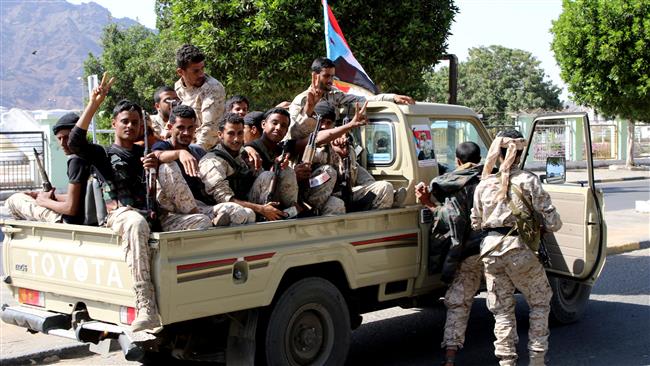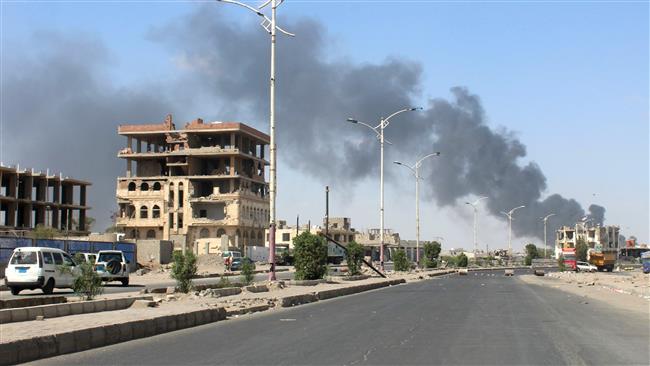
UAE-backed southern Yemeni separatists ride on the back of a truck in Aden, Yemen, January 29, 2018. (Photo by Reuters)
The United Arab Emirates has been the leading partner in Saudi Arabia’s military coalition running the war machine against Yemen since the outset of the aggression. And in recent times, the tiny Persian Gulf state’s increasing support for secessionist ambitions in southern Yemen has raised questions surrounding the Emirates’ real agenda by taking on an ever-expanding role in the conflict. This, coupled with another set of compelling facts, has resulted in this idea taking hold that the UAE is seeking to expand its sphere of influence in the region politically, militarily and last but not least financially.
Here’s a quick check of some ulterior motives that the Abu Dhabi rulers may have.
Yemen Breakup
The UAE has been openly financing and arming separatist militants in the southern port city of Aden with the so-called Southern Transitional Council in their confrontation against the Riyadh-sponsored forces who are loyal to the former government.
Their leader Aidarous al-Zubaidi has been receiving patronage from Abu Dhabi to campaign for secession. The separatist leader has even famously acknowledged receiving “generous support — in terms of money and forces from the UAE,” adding “it was not expecting anything in return.”
The southern port of Aden is of strategic importance as it is situated along the Bab-el Mandeb Strait, one of the world’s busiest shipping lanes in the transit of oil and gas.

Smoke billows in Aden as separatists move closer to taking full control of the southern Yemeni city on January 30, 2018. (Photo by AFP)
Prisons vs. Projects to Buy Public Support
The UAE has been running secret prisons — notoriously titled ‘black sites’ — in Yemen, where hundreds of inmates suffer mistreatment, torture and forcible disappearance. The massive detention campaign primarily targets individuals who are opposed to the Emirates’ presence in Yemen.
At the same time, the monarchy has been injecting a huge pile of cash, adding up to billions of dollars, into the war-ravaged and ailing infrastructure in the south to buy public backing.
The campaign of manipulating public opinion has apparently succeeded in gathering support for the UAE among a segment of the southern population, with pictures of Emirati royals popping up across administrative buildings in Aden.
Military and Naval Adventures
Meanwhile, the UAE has been seeking to gain full control of Yemeni ports in a bid to reinforce its foothold in the Arabian Peninsula country. It is also currently running the Aden airport.
Bab-el Mandeb Strait is of immensely strategic importance to the UAE not only because it is the main artery for the transit of oil and gas through the region, but also because it provides access to the Red Sea and Suez Canal from one side and to the Indian Ocean from the other.
In order to impose full control over the strategic waterway, the UAE has even been expanding its naval presence in the East African states of Ethiopia, Djibouti and Somalia.
Greed for Energy, Resources
Yemen is a country rich in oil and gas reserves and that has served as an added incentive for the UAE to choose to be a partner in the war.
Abu Dhabi has previously made attempts towards capturing oil and gas fields in the provinces of Shabwah, Marib and Hadramawt.
Still another financially and strategically lucrative project for the UAE has been the control of Yemen’s Socotra Island and Abd al-Kuri Island.
There have been reports of former president Mansur Abd Rabbuh Hadi renting out the two islands to the UAE for 99 years in 2016, in an attempt to gain Abu Dhabi’s support amid the conflict gripping the impoverished state.
Socotra, a small archipelago of four Indian Ocean islands, lies to the east of the Horn of Africa and to the south of the Arabian Peninsula.
The UAE has set up a military outpost on Socotra Island which it uses to train its forces. Emirati forces and aid organizations have been stationed there since November 2015.
But that is not the only concern locals have regarding the UAE’s expanding presence. Another major problem is excessive fishing.
Locals accuse the UAE of depleting stocks by overfishing in regional waters, and transporting the fish to the Emirates’ markets via ships and aircraft.
They are also complaining that UAE tourism operators have entirely monopolized the sector, by operating weekly commercial flights and selling package vacations to tourists.
source: Presstv. com





